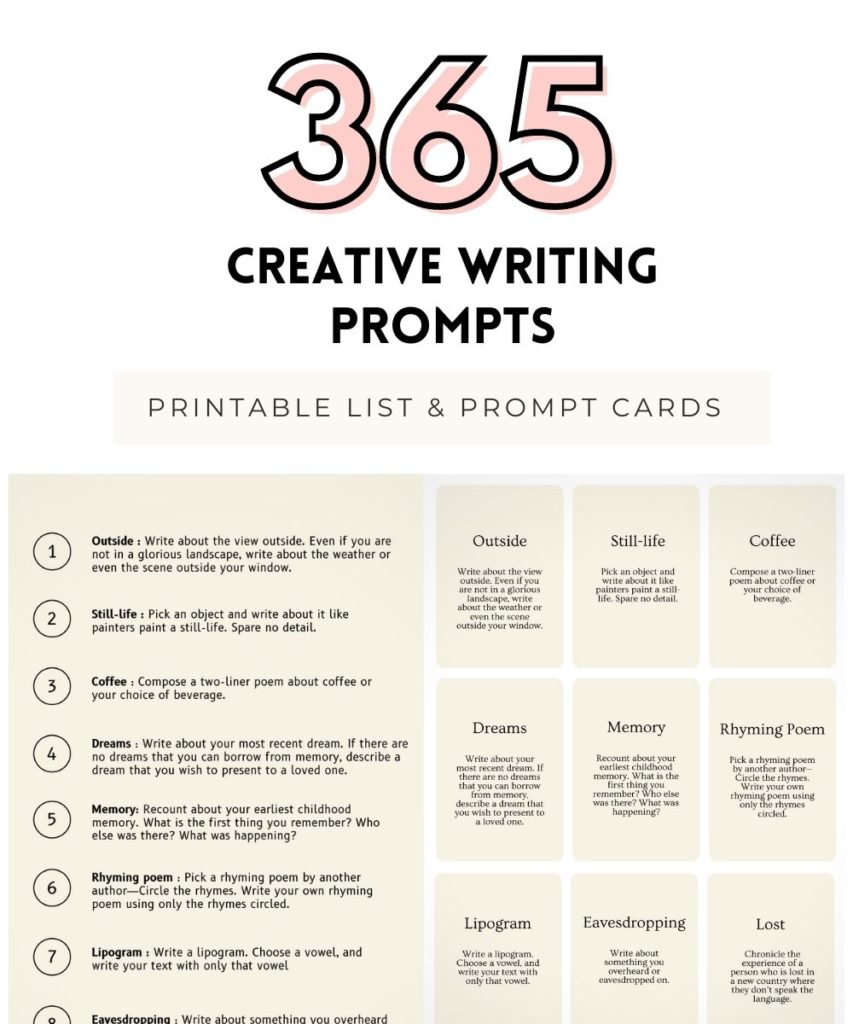Let me guess:
You’re a prolific creator and can write over a thousand words a day easily.
Since you’ve to write regularly, you tend to run out of interesting topics to write about.
Alternatively, you write at leisure, but seriously want to complete the novel you recently started writing.
However, you face a lot of resistance in typing those first few words, in every writing session.
The fundamental problem in both scenarios is that you feel rusty.
You might have even tried a few writing prompts and writing exercises but to no avail.
Don’t you worry, mi amigo, I’ve got you.
Whether you’re writing blogs, fiction, essays, or creating content for any other platform, I’ve got you covered. In this article, you’ll learn tips, strategies, and a few tools to spark ideas for writing. I have even shared some random topics to write about.
Note: This article contains affiliate links. This means if you purchase anything using my link, then I earn a commission (at no extra cost to you). I only recommend products that I personally find valuable and enjoy. I appreciate your support!
You can directly get started with writing on these subjects or pick one of the below as an exercise to get your juices flowing. Let’s start with a few specific writing prompts and interesting ideas.
Creative Blocks Are Frustrating…
Do you want to practice writing every day, but inspiration is hard to come by? Presenting a printable with 365 writing prompts and cards: one for each day of the year. They are yours for $9+!
Now You’ll Always Know What To Write About >>
Sixty Six Interesting Ideas To Write About…
If you’re feeling stuck or just want to type stuff, here are sixty-six subjects that you can write on. I’ve organized the prompts and topics into four sections, so pick the one that you like the most and crush the writer’s block.
15 Personal Topics You Can Write About
How about some self-reflection? Often, going back to yourself can flex those writing muscles. Here are a few subjects you can write about and gain perspective on your life.
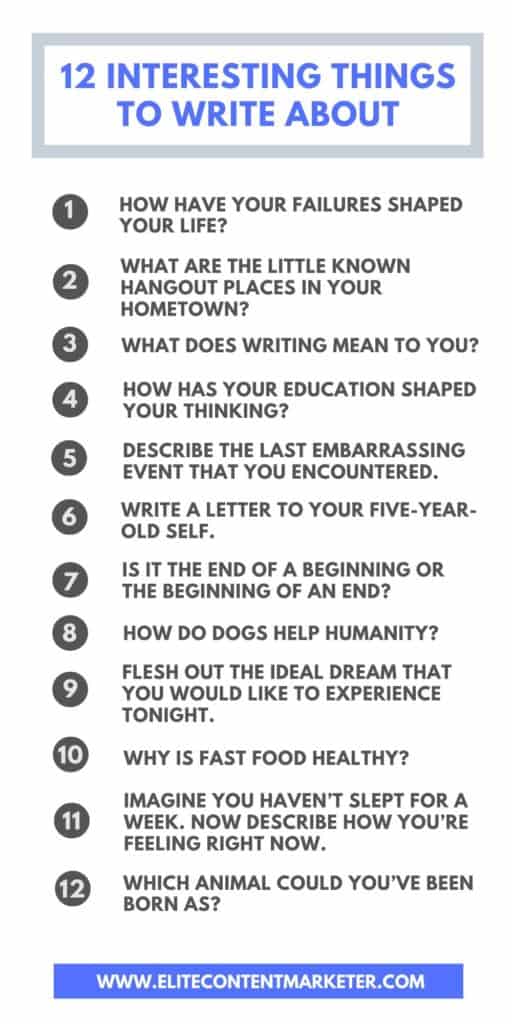
1. How have the top failures in your life shaped you?
2. What are the little known hangout places in your hometown?
3. What does writing mean to you?
4. How has your education shaped your thinking?
5. Describe the last time you got super embarrassed.
6. Write a letter to your five-year-old self.
7. You’re stuck in an elevator with the high school teacher you hated the most. What will you tell her?
8. Act as your father and write a letter to yourself.
9. Describe your first encounter with politics.
(How long can you talk about politics?)

10. Recall the first fight you had in your childhood. Now, write an apology to the person you fought with.
11. Assume you’re wrong about the way you think the world functions. Now find as much evidence as possible to prove it.
12. What are the top things people know about you that aren’t true?
13. What’s your favorite drink?
14. The world is coming to an end in a week. What are the three things you would like to do?
15. What are your top three needs without which you can’t function normally every day and why?
16 Fun And Weird Writing Ideas
If you’re searching for things to write about when you’re bored, then this section will provide the necessary ingredients. Let’s get started with the first fun writing prompt.
1. Is it the end of the beginning or the beginning of the end?
2. How do dogs help humanity?
(Want a hint?)

3. Flesh out the ideal life that you would like to experience.
4. Why is fast food healthy?
5. Imagine you haven’t slept for a week. Describe how you’re feeling right now.
6. Which animal would you have been born as?
7. What’s your least favorite social media platform and why?
8. Is there a pop culture fad that you hate? Throw some light on your hate and contemplate why people are so fond of it.
9. Parody your favorite song.
10. What are the most boring ways to cure boredom?
11. What are the dumbest ways to stay dumb?
12. How do you define food? Mention the top characteristics that are essential in every meal you have.
13. Your best friend is crying because they have put on weight (and weigh 195 pounds now). What would you tell them?
14. What are some weird things to eat with coffee?
15. Do people need more juice or wine?

16. You live in Gotham and the Joker wants to meet you for coffee. Write a script for a five-minute conversation with him.
10 Writing Prompts About The World
In this section, let’s look at a few prompts about worldly problems with a creative twist.
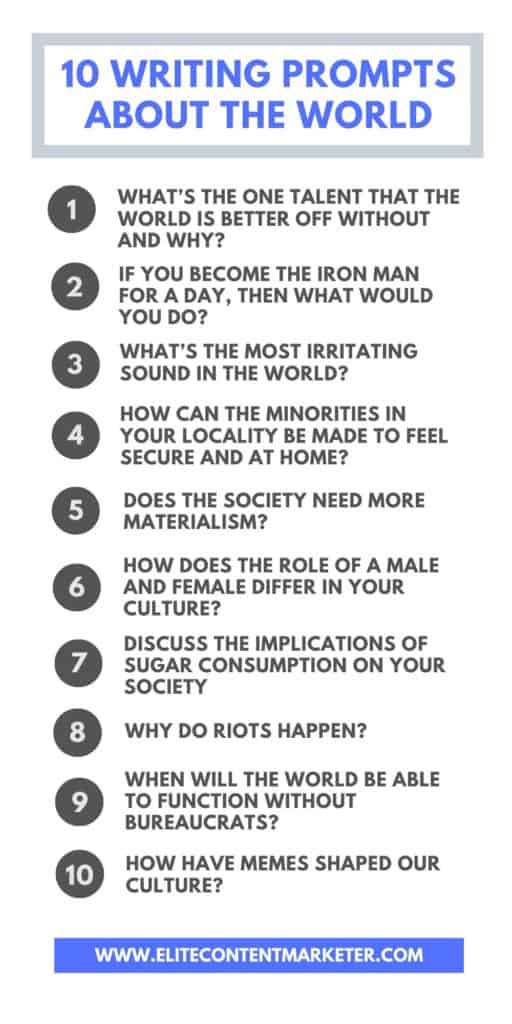
1. What’s a talent that the world is better without and why?
2. If you become Iron Man for a day, then what would you do?
3. What’s the most irritating sound in the world?
4. How can the minorities in your locality feel secure and at home?
5. Does society need to be more materialistic?
6. How does the role of a male and female differ in your culture?
7. How have memes shaped our culture?
(Can you clear Shakespeare’s doubt?)

8. Why do riots happen?
9. When will the world be able to function without bureaucrats?
10. What role does sugar play in our everyday life?
25 Things To Write About, For Your Business Blog
If you want to create content for your business website, then this section shares a few proven subjects that generally get loved by readers.

1. Write the story of how you put together your business and the learnings from running it so far.
2. What’s the most loved article on your website? Write a followup to it.
Five years ago, business consultant Mark Schaefer wrote a post titled “content shock” that went insanely viral. Since then, he has covered the subject multiple times on his blog, the latest being last year.

3. Summarize your favorite book and share any of its learnings that you use.
4. Share a list of the books that you’ve recently read and found valuable.
5. Answer the most frequently asked question by your audience regarding a specific aspect of your business.
River Pools answered a pertinent question of their prospects “How Much Does a Fiberglass Pool Cost” on their blog. It ended up generating over 2 million dollars worth of sales for the company.

6. Write a beginner’s guide on your reader’s glaring pain point. You can also expand it into an “ultimate guide”, just like the article you’re reading.
7. Create a listicle of your favorite business tools that you can’t live without.
8. Prepare a questionnaire that shares your top business challenges. Now invite a fellow content creator/entrepreneur in your network for an interview on your website.
9. Write down your top five productivity hacks that you use every day.
10. Compile a list of the top conferences and events in your industry that your readers might find useful.
11. Write a “how-to” article that teaches your readers a pertinent subject in your industry. It could mean a breakdown of a recipe, installing WordPress and starting a website, or getting a style makeover.
12. Take your readers behind the scenes of how you run your business every day.
Buffer has baked transparency in its company culture. They share honest accounts of their success, failures, and everything else on their open blog. It even includes their founder’s story of getting burnt out and taking a 6-week break to recharge.
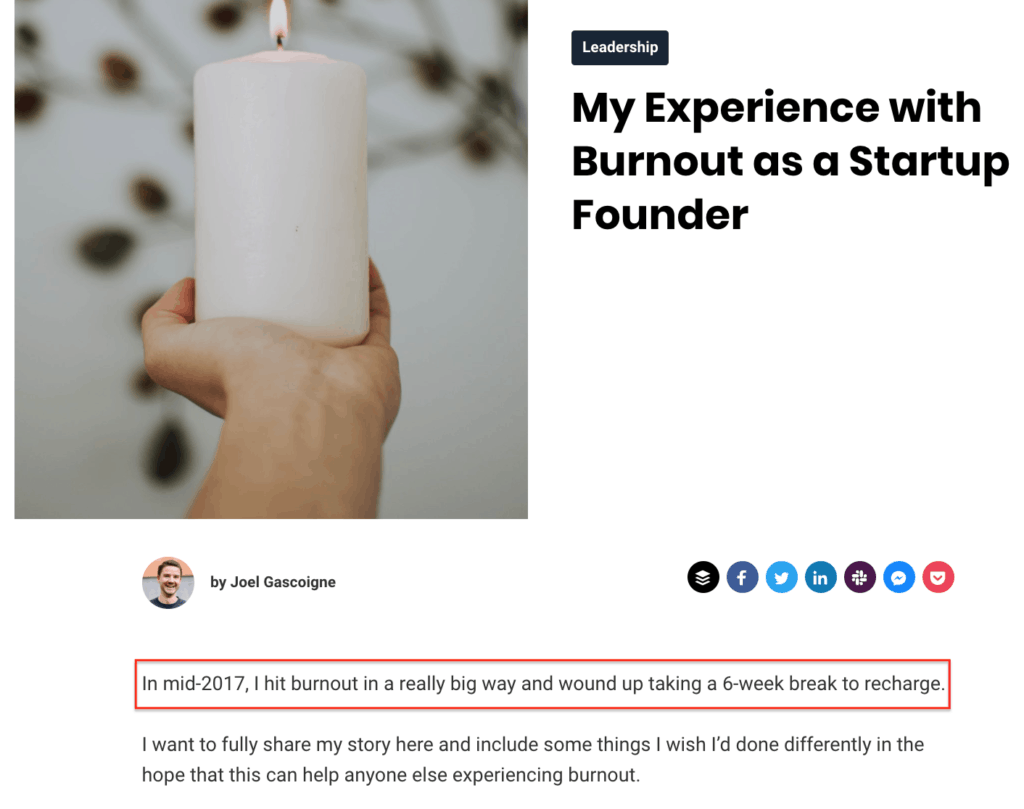
13. Look at the top content of your competitors and let that spark fresh ideas.
14. Round up the top myths in your industry in a piece and share the correct beliefs that people should know about.
15. Review your most used product and share actionable ways that a new user can leverage it.
16. Are there any popularly accepted opinions in your industry that you strongly disagree with? If so, write a counterpoint article with stats, examples, and anecdotes from your experience.
17. You can always find new angles on popular subjects in your industry.
Animalz offers content marketing services to SaaS companies. So they run a blog on content marketing, a topic that’s been covered to death on the web. They still manage to breathe fresh air into old subjects. Just look at the intriguing titles of their content marketing guides below:

18. What are the ethical dilemmas you’ve encountered while running your business and how did you tackle them?
19. Write a post about the causes you support and why you care about them.
20. Roundup your favorite podcasts/blog posts from the last year with the top takeaways for your readers.
21. Suppose your business wants to create a web show that your audience will love and launch it on YouTube. Write down a one-page introduction to its screenplay.
22. Write an article showing the top features of the products you sell. Marketers call this “bottom of the funnel” content and it could be quite effective at generating new business.
For example, Ahrefs CMO Tim Suolo covered thirteen things that only their digital product could do in a post.

23. Invite your top users to share how they find your product valuable. You can consider creating a case study from their experiences.
24. Write down answers to the frequently asked questions regarding your product and business.
25. Conduct a business experiment and share its updates regularly. It allows your readers to connect with your brand.
GrooveHQ started their blog by sharing the “real story” depicting the struggles and challenges of running a small business. Their personal tales resonated deeply with their audience and led to the quick growth of their blog.
Here’s a snippet of their revenue progress bar that they shared live on their blog in the early days of their business:

While these ideas are great jumping-off points, I want to empower you to come up with new subjects on your own. In the next section, you’ll learn five effective ways to do the same.
Confused What To Write About? Here Are Eight Simple Strategies…
Whether you’re stuck with writing a blog post, article, or story, here are eight strategies to discover and come up with interesting subjects to write about.
1. Scan The Headlines Of Bestselling Books And Popular Articles
A great place to spark fresh ideas is exploring the work of other writers. Indeed simply scanning the headlines can help jumpstart your writing. Here are a few platforms you can try:
1. Scan The Amazon Bestsellers List
Amazon remains a popular place for shoppers to buy books. Their bestsellers list is updated every hour with the ranks based on what’s selling well.
As an author, you can look at the eclectic mix of both nonfiction and fiction titles. I recommend you begin exploring the books by their department in the sidebar on the left.
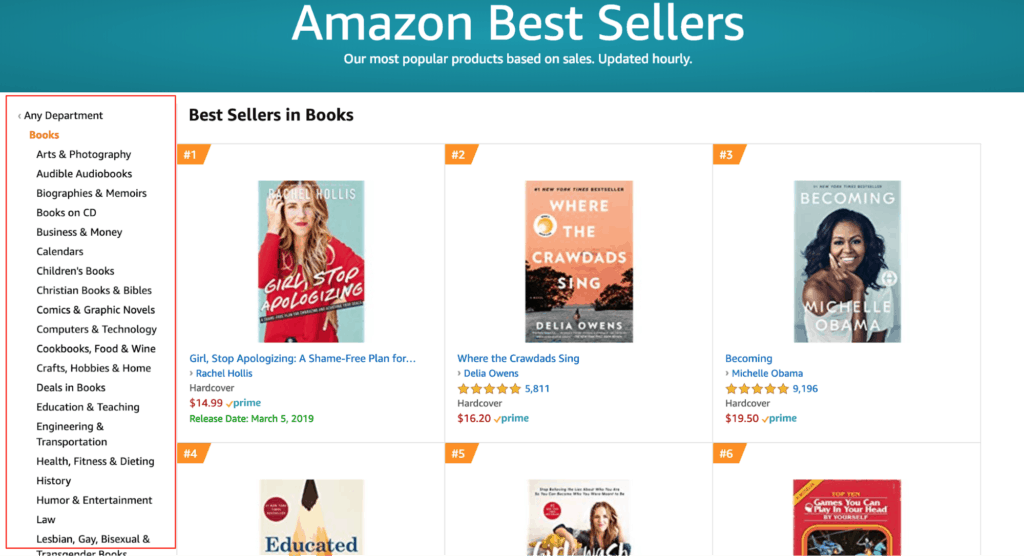
Here are the best sellers in romance. Note how in the left sidebar you can granularly explore subsections. Right off the bat, you’ve six titles you can use as a writing prompt.
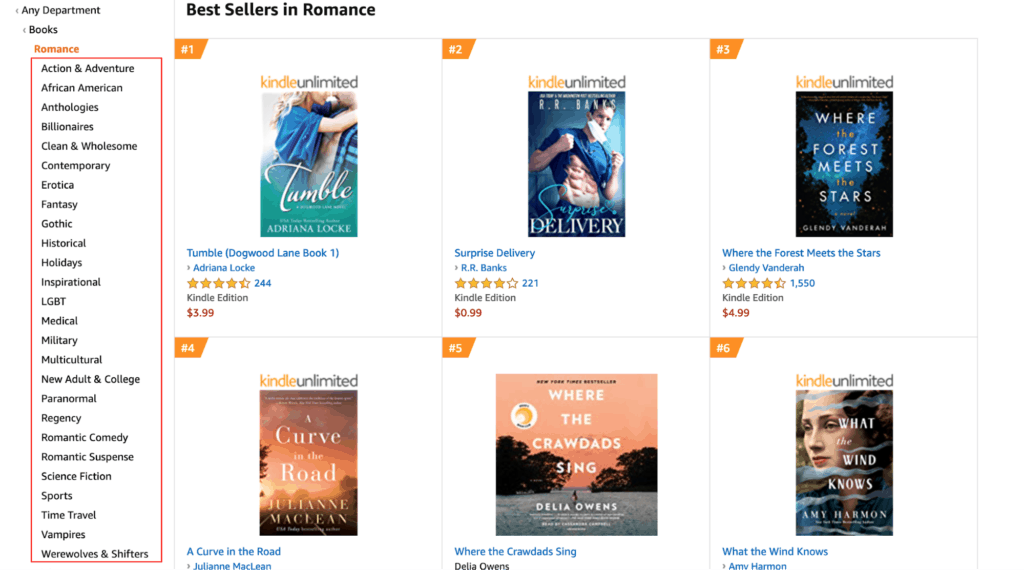
I could write a short fantasy story on #3: “Where the forest meets the stars.”
How about you?
2. Plug Your Favorite Website Inside Social Animal
You can also scan the headlines of the most shared articles on social media from a website of your liking. Start by plugging the website inside Social Animal and the tool will return the most popular pages from the past one year.
For example, below are the most shared articles from longreads.com in the last year:

If you’re creating content for your business, you can consider plugging a competitor’s website inside the tool. Once you’ve got a few relevant subjects, come with newer angles, and cover the same subject.
Suppose I find that “meditation techniques for working professionals” is a popular subject among my readers. Now I’ll write on “standing and walking meditation techniques for working professionals.” It’s a novel subject that isn’t covered extensively and it’s relevant for the busy working class.
See how it’s done?
2. Keep A Notebook (Or Evernote)
If you’re a creator, ideation is a critical part of your work. But your creative juices might not always flow at your will. Ideas can arise even while you’re driving, doing dishes, bathing, or attending to some other tedious task. At such moments, noting these ideas can be a hassle and you might not have a notebook and pen.
Evernote, one of the best note taking apps out there, offers a better bet. It works on all the common platforms — iOS, Android, Mac, Windows, and on your browser. And it offers two handy ways to organize the items you choose to save: tags and notebooks. They both have their utility, but choosing a notebook for every item is necessary.
Here’s a glance at my notebooks and a few tags:
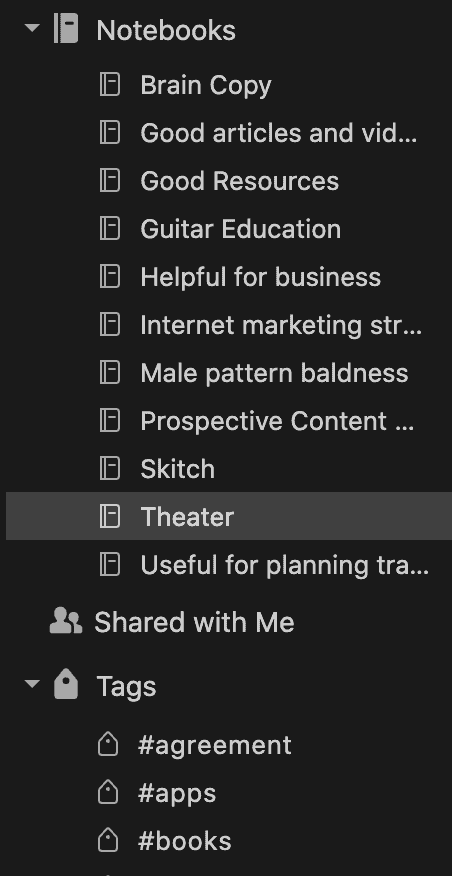
With its mobile apps, you can store even your wildest of ideas in Evernote (even when you’re on the subway!) and go back to them when you feel uninspired. And it’s not merely plain webpages — you can also save photos, videos, and voice clips in one of its Notebooks.
I also use the Evernote Chrome extension to clip articles I find interesting. The software automatically chooses a Notebook for all the pages you save, though its categorization can be faulty. I can add my commentary to each saved item and refer to them later for inspiration. Taking screenshots of web pages and annotating them through Skitch is also possible.
If you’ve enabled the Evernote extension on your browser, then on performing a Google search an Evernote tab appears in the top right corner. It shows notes related (that you saved in Evernote earlier) to the subject you’re researching. Occasionally these notes result in the addition of an example or a resource to an article I’m working on.
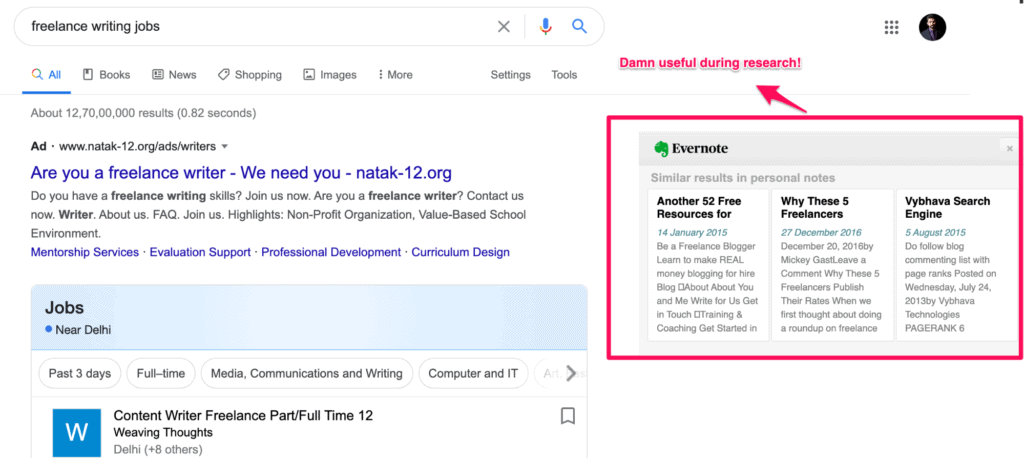
The Evernote Premium version syncs across multiple devices and offers a generous 10 GB storage. But you can get started with its free version that offers a capacity of 60 MB (which is pretty decent for storing your notes’ archives) and syncs two devices.
3. Re-outline
Whether you write nonfiction or fiction, an outline will lay a strong foundation for you. If you haven’t created one, then do it now so that you know the structure of your writing project and the direction it needs to go in.
The other scenario is that you’ve hit a wall because you can’t seem to expand on your current outline. In fiction, it might indicate indecision on which way your story should jump. Whereas if you’re writing a blog post, it might mean you created a shorter outline.
In either case, it makes sense to get back to your outline and redo it with some research as well as brainstorming. Limit the re outlining session to about 10 minutes so that you power through quickly.
4. Solve The Pertinent Problems Of Your Readers
If you’re a nonfiction writer serving an existing readership, then one of your main goals is to solve the problems of your readers. Here are a few tools to find the top questions that they are asking:
1. Quora
The question-and-answer-platform gets hoards of curious visitors. You can directly search for a subject you’re writing about to find the top questions people are asking on it.
Suppose I’m writing an article on “Yoga vs. Gym.” On performing a search, here are a few questions I found people asking. I already have three important aspects of the subject (marked in red) that I should address in my article.
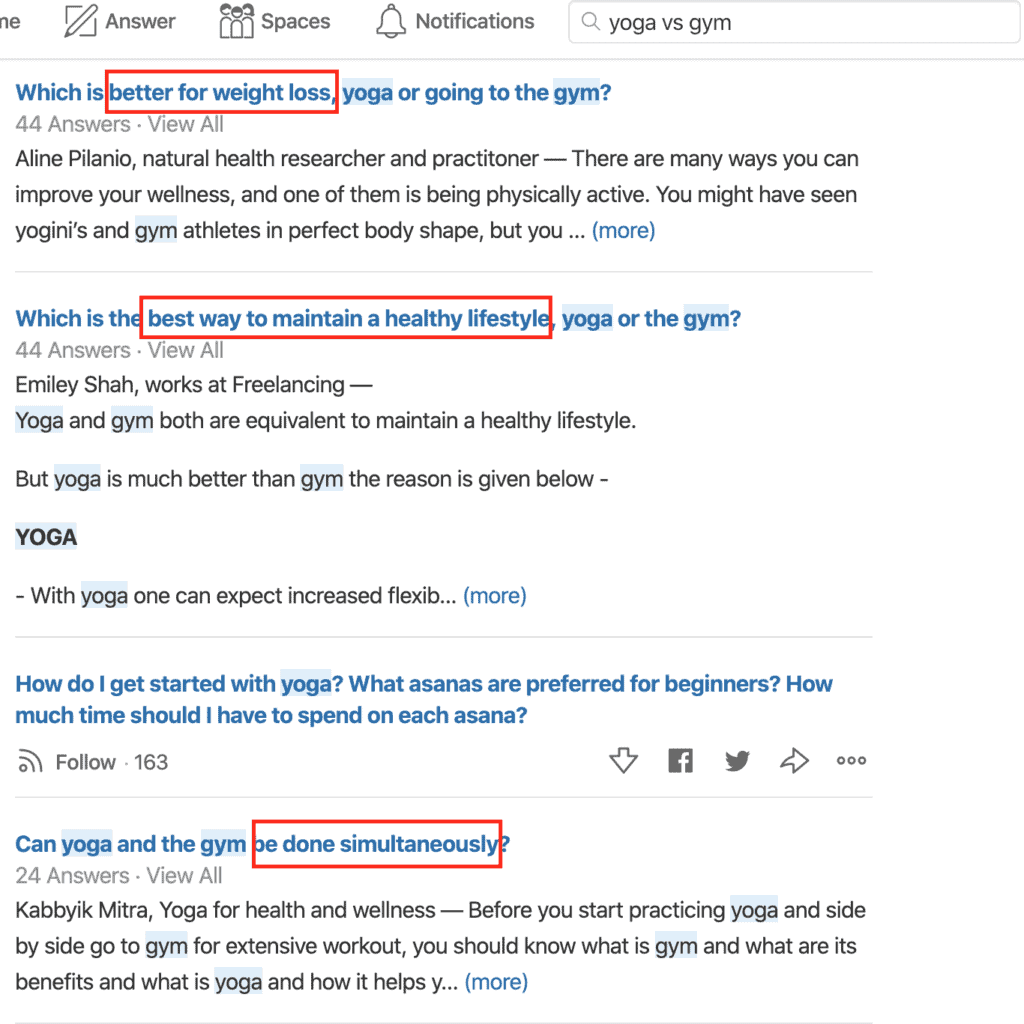
How about a tool that aggregates all the top questions that your audience is asking on a keyword and represents them visually? “Answer The Public does that by collating all the data users are typing inside Google & Bing. Here are the top questions returned for “yoga vs. gym”:
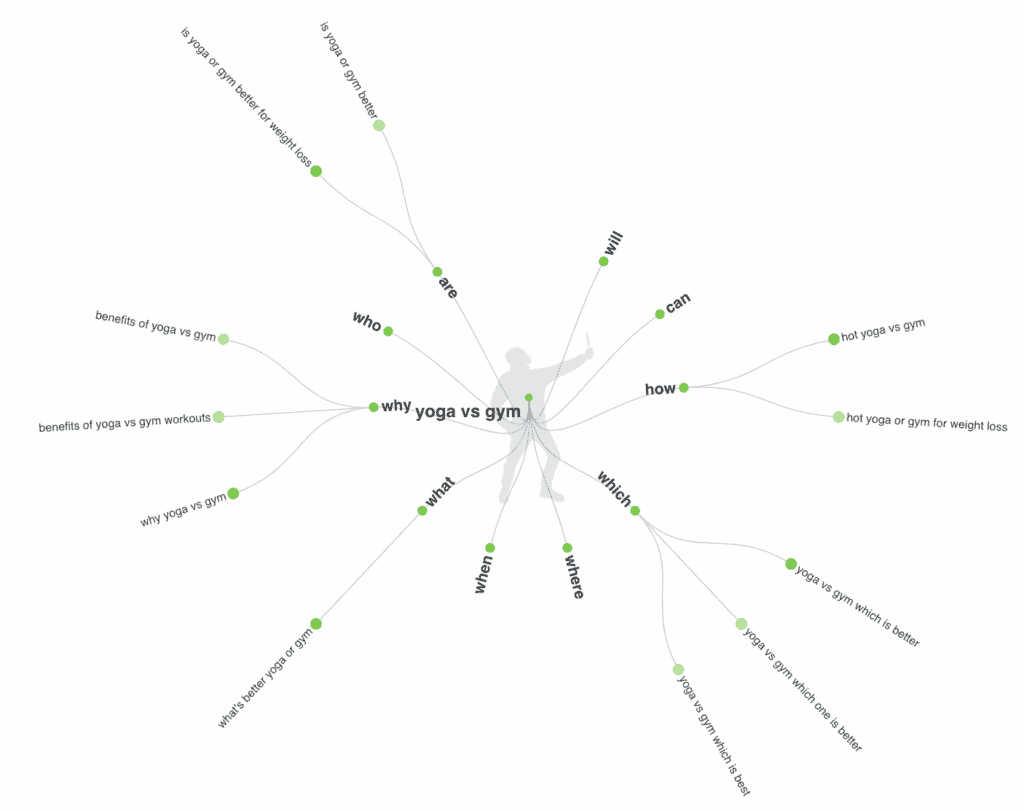
3. Survey Your Readers
Who can tell you more about their problems, motivations, and emotions than your readers themselves? So if you have an existing email list, reach out to your readers directly and ask them about the top subjects they would like you to tackle on your site.
Indeed it’s a good idea to take feedback from your readers regularly. So, like Jorden from Creative Revolt, consider asking questions and interacting with your subscribers at the end of your email in a postscript.
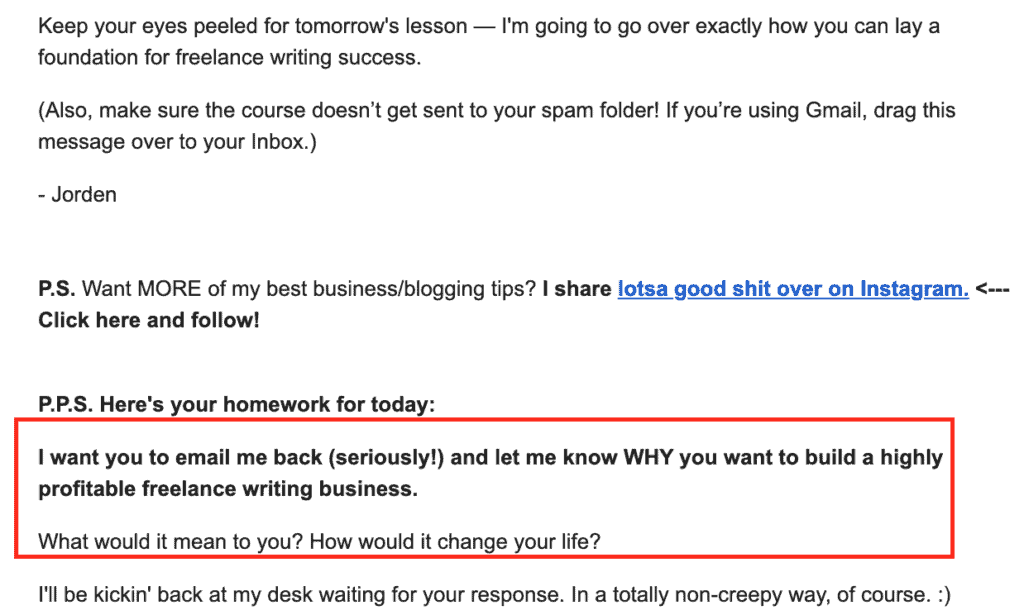
If you prefer staying organized, then you can use a tool like Survey Monkey to conduct a survey smoothly and generate insights.
Don’t have an email list, but an existing audience on Twitter, Slack, or other social media? Then you can conduct a poll on these platforms asking people what they struggle with the most and you can lend a hand with your blog post.
Here’s a poll copywriter André Spiteri conducted on Twitter that led him to his article’s subject on “nailing blog post introductions.”

5. Focus On Narrower Topics
When I first pitched my ideas to my editor at Foundr magazine, she gave me a piece of advice that is helpful for finding newer writing subjects when you’re stuck. She suggested attacking “more focused topics” instead of broad subjects:

Owing to the intense content marketing competition, most broad subjects have already been covered to death. It’s difficult to bring anything new to the table. However, you can get granular and hone in on a specific detail.
Instead of creating an article on “how to start writing your book”, you can attack a narrower subject like “how to write the first chapter for your novel.”
If you’re creating content for your blog, you might be afraid of narrowing the coverage of your subjects because a focused subject will have reduced readership. However, your writing will resonate deeply with those few readers and they might share it with their friends.
6. Read News And Explore What’s Trending
Is Twitter buzzing with a virus outbreak that’s slowed economies across the world? Maybe people are talking about a movie release that’s happening later this week.
The trends can serve as standalone writing subjects if your audience would like your analysis of them. However, it isn’t essential to newsjacking such events. You can also pick up ideas and anecdotes from these emerging events and integrate them into your writing.
So the next time you’re stuck and want an interesting idea, try reading the news.

Beyond the dedicated “trending” hashtags on Twitter and media publications, you can also use Google Trends. Try the Google Search Trend reports from the last couple of years. It’s even broken down into convenient sub-categories. Here’s a snapshot of the 2019 report.
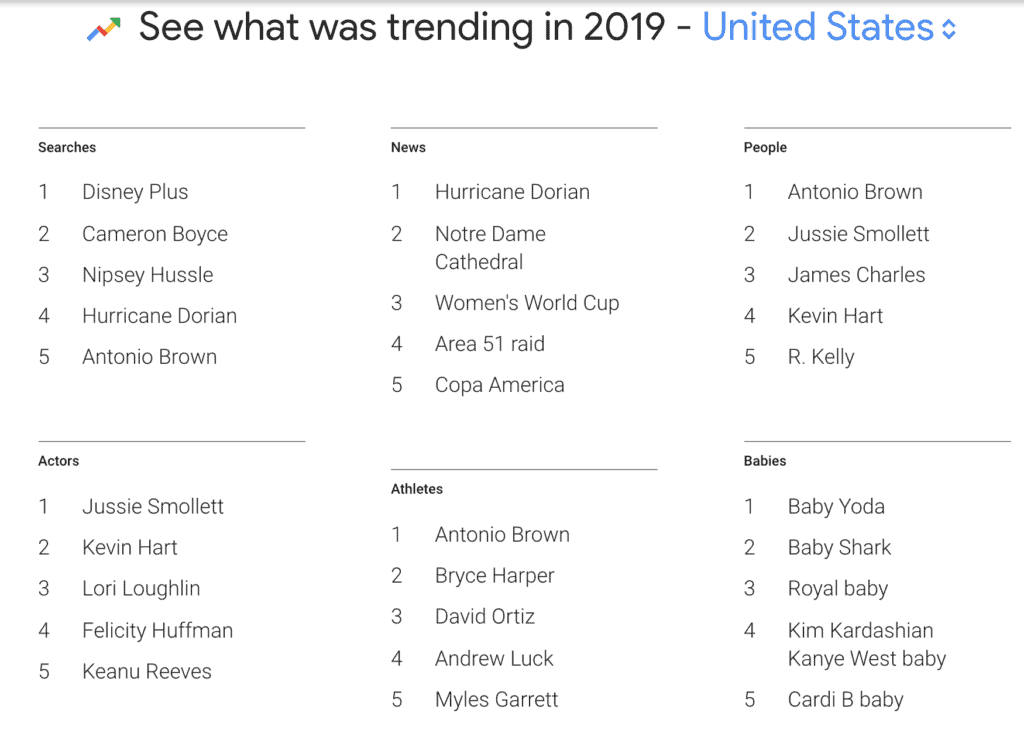
Do these events, searches, actors, and athletes spark hot ideas for an article (or maybe give direction to an existing piece)?
6. Research Keywords With Ubersuggest
While we’re on the subject of the problems your audience is facing, how about some good old keyword research with quantitative data?
While most tools on the market are paid and limited, Ubersuggest offers substantial data for free.
I plugged our example query “yoga vs. gym” in Ubersuggest. Here’s data related to this query, and a few related keywords that people are typing in Google with their approximate monthly search volume:

Not only do you get ideas that can be covered in your article (like practicing yoga and gymming on alternative days), but you should also use these exact keywords inside your article.
Here’s why:
- It’s a great way to make your readers feel included by writing in their language.
- It helps Google’s algorithm understand the subject you’re writing about in more detail.
If you scroll down, Ubersuggest also shows the most shared articles on your subject from around the web.

The tool is a goldmine for bloggers and content creators to find data-backed content ideas that are proven to work.
7. Let The Music Play!
Do you know that happy music can facilitate divergent thinking (a method used for generating creative ideas)?
Indeed in my method acting training, we were taught using music as a tool to feel a requisite emotion for a scene before performing.
So open your digital jukebox and let yourself relax. Listening to your favorite music could even uplift your mood and inspire you to come up with new ideas.
Begin experimenting with various mood playlists on Spotify to evoke unique ambiances (here are thirteen you can try). You can also explore YouTube music and its curated mood-based playlists.
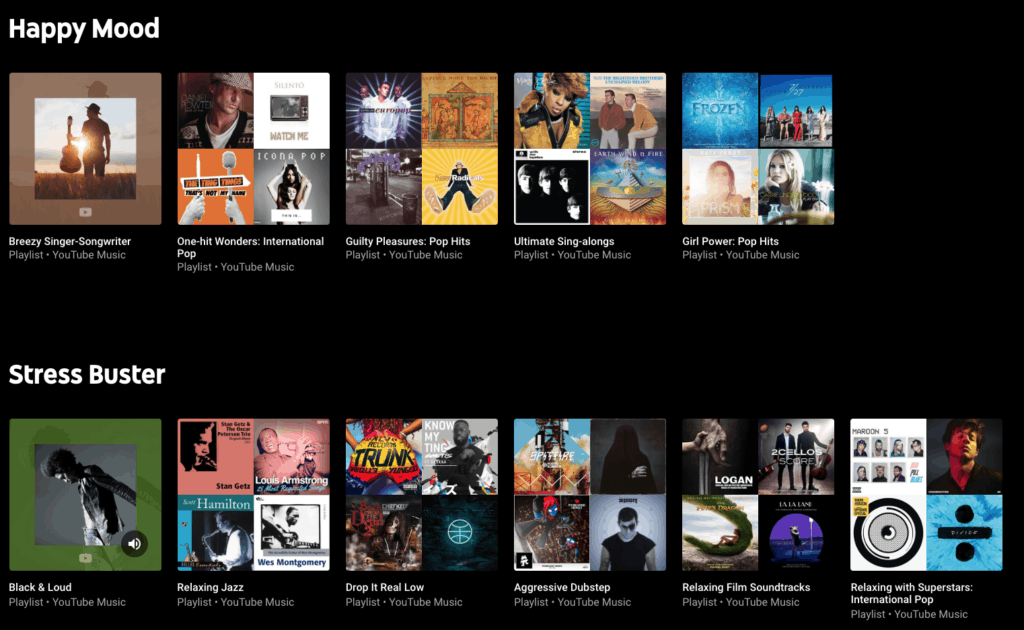
If you find that a certain genre of music helps you quiet your racing thoughts and internal chatter, then let that kind of music play.
8. The (Not So) Secret Strategy For Battling “I Don’t Know What To Write About…”
Alright now let’s get the prolific and successful writers out of the closet.
- How do they get SO MANY brilliant ideas for writing?
- How can they not get nervous, afraid, and frustrated to create every day?
- It’s not any of the above seven strategies. There’s a secret recipe they must follow, huh?
I’m sorry to break it to you, but they don’t have a secret. They have fears like us. They run out of ideas. They battle imposter’s syndrome and hit writer’s block. However, they push through self-doubt and the fear of failure, which are major reasons we get stuck in creative work.
Let me share an example:
“Eat, Pray, Love” author Elizabeth Gilbert felt terrified while writing a followup to her blockbuster international bestseller. She even started thinking of dumping the project. However, she found a way to change her relationship with her work.
In her TED Talk, ‘Your elusive creative genius’, she shares a psychological construct that can liberate creatives like us from the results of our works:
Let me quickly show you the two main things that are relevant to us. The first aspect was the idea of what should count as ‘genius’:
“…the Romans did not actually think that a genius was a particularly clever individual. They believed that a genius was this, sort of magical divine entity, who was believed to literally live in the walls of an artist’s studio, kind of like Dobby the house-elf, and who would come out and sort of invisibly assist the artist with their work and would shape the outcome of that work.”
The second aspect clarifies how you the above concept takes the pressure off you:
“…if your work was brilliant, you couldn’t take all the credit for it, everybody knew that you had this disembodied genius who had helped you. If your work bombed, not entirely your fault, you know? Everyone knew your genius was kind of lame.”
Ultimately getting new ideas boils down to stop judging your creative process. Gilbert found her way by going back to ancient Rome and ancient Greece. You just need to find yours.
Now You’ve Got Cool Things To Write, Huh?
Thought so.
As you know, all stories worth telling have already been told. Most interesting topics have already been written about. However, that shouldn’t forbid you to write on these subjects in your unique voice, spicing it up with your life experiences and your creativity.
I have shown you how to find things to write about with actionable tips and tools. And even shared some random things to write about.
Hopefully, the article gets your creative juices flowing, and leaves you with something to write about.
